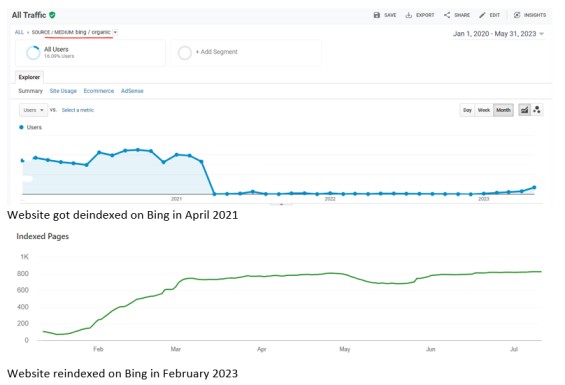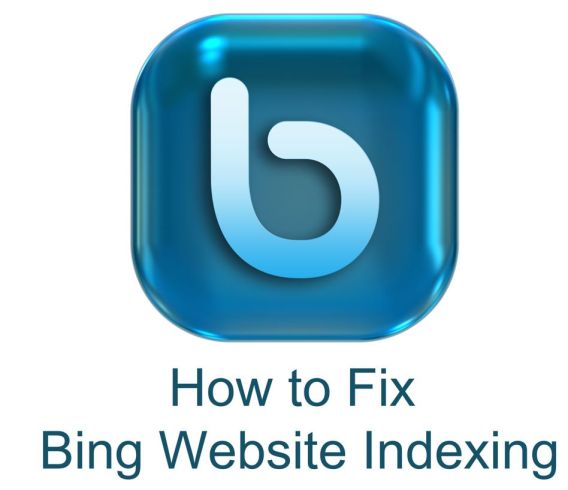If you’ve been experiencing issues with Bing not indexing your website, you are not alone. Many website owners have faced challenges when it comes to getting their pages indexed by Bing. While Bing has a 6.5% search engine market share against Google’s 88.9% search engine market share in the USA, it still plays a significant role, especially as it powers search results for platforms like DuckDuckGo. In this comprehensive guide, we’ll explore the common reasons behind Bing indexing problems and provide actionable solutions to help you get your website indexed effectively.
Understanding Bing Indexing Importance
Before we dive into the solutions, let’s briefly understand what website indexing entails and why it’s crucial for your online presence. Indexing is the process search engines use to gather and store information about web pages. When a search engine indexes your website, it means that your website’s pages are added to its database and can be displayed in search results when relevant queries are made.
Bing, like other search engines, uses several factors to determine which pages to index and how frequently to crawl them. While Google is known for its strict penalties and frequent algorithm changes, Bing generally has a more lenient approach. However, this doesn’t mean that Bing indexing issues should be ignored. Being indexed by Bing can contribute to your website’s overall visibility and help you reach a wider audience.
How I got website indexed back on Bing – Case Study
The website was deindexed on Bing. I was able to get the website reindexed in Bing Search. A technical SEO issue on the website led to the website not being indexed in Bing search results. Following Bing webmaster guidelines, troubleshooting, and a thorough technical SEO audit can fix the issue of the website not being indexed by Bing.

CMS – WordPress
Hosting Provider – Godaddy
Technical SEO Audit pointed to possible reasons for website not getting indexed on Bing –
Website redirect issues from www. version of the website to non-www. version (redirect from https://www.example.com/ to https://example.com/) and errors such as err_too_many_redirects in wordpress.
SSL installation issues with redirect between secure https version.
There were multiple .htaccess files.
Steps taken to get the website indexed back on Bing –
Completely Uninstall and Reinstall WordPress.
Uninstalling WordPress and installing a fresh, 100% blank copy results in losing all existing content and therefore taking backup of content is important. Under this method, all of your existing WordPress files are deleted and a fresh copy of WordPress is installed.
Reinstall SSL certificate.
Reinstall the theme.
Reinstall and update all the plugins.
Note- Every website has different configuration and there can be multiple factors that can affect the website’s ability to get indexed on search engines. Below are possible reasons and recommended solutions to resolve Bing indexing issues.
Possible Reasons for Bing Indexing Issues
When your website is not indexed by Bing, it can be frustrating and affect your site’s discoverability. Several factors could be contributing to this issue. Let’s explore some of the common reasons why Bing may not be indexing your website:
-
New Website or Lack of Discoverable Links
If your website is new or doesn’t have any external links pointing to it, Bing may not have discovered and crawled your pages yet. Search engines typically rely on links from other websites to find and index new content. Without these links, your website may remain unnoticed by search engine crawlers.
-
Crawlability Issues
Bing may encounter difficulties crawling your website, preventing it from indexing your pages. This can occur if your website has technical issues, such as slow page load times, server errors, or excessive use of Flash or JavaScript. These issues can hinder Bing’s ability to effectively crawl and index your site.
-
Content Blocking
Bing respects the instructions provided in your website’s robots.txt file, which tells search engines which pages they can and cannot crawl. If your robots.txt file is blocking Bing’s crawlers, it may not be able to index your website’s pages. Ensure that your robots.txt file is properly configured to allow Bing’s crawlers access to your content.
-
Noindex Meta Tag or Header
If your web pages contain a <meta name=”robots” content=”noindex”> tag or a corresponding X-Robots-Tag HTTP header, search engines like Bing will interpret it as an instruction to exclude those pages from indexing. Double-check your website’s code to ensure that you haven’t inadvertently added a noindex directive.
-
Quality Threshold Requirements
Bing maintains quality standards for the websites it indexes. If your site does not meet Bing’s quality threshold, it may not be indexed. Factors that can affect your website’s quality include thin or duplicate content, excessive ads, or deceptive practices. Review Bing’s Webmaster Guidelines to ensure that your site adheres to its quality standards.
-
Website Penalization
In some cases, if your website violates Bing’s guidelines, it may be penalized and removed from the search engine’s index. Review Bing’s guidelines to ensure that your website doesn’t engage in any practices that could result in penalization.
Resolving Bing Indexing Issues: Actionable Solutions
Now that we’ve identified potential causes for Bing indexing issues, let’s explore actionable solutions to help resolve these problems and get your website indexed effectively:
-
Create High-Quality, Link-Worthy Content
To increase the chances of Bing indexing your website, focus on creating high-quality content that provides value to your target audience. Engaging content that attracts natural links from other websites can signal to Bing that your website deserves to be indexed. Invest time in developing informative articles, engaging blog posts, and useful resources that other websites would want to link to.
-
Generate External Backlinks and Internal Links
Building a strong backlink profile is essential for search engine indexing. Seek opportunities to earn external backlinks from reputable and relevant websites within your industry. Connect with influencers, participate in guest blogging, or create shareable content that naturally attracts backlinks. The more high-quality backlinks you have, the higher the chances of Bing discovering and indexing your website.
Use internal linking to help Bing discover and index your website’s pages more effectively. Link relevant pages together to create a logical site structure.
-
Verify website ownership
Ensure that you’ve properly verified ownership of your website using Bing Webmaster Tools. This involves adding a verification code or file provided by Bing to your website’s root directory.
-
Submit Your Sitemap to Bing Webmaster Tools
Creating and submitting a sitemap to Bing Webmaster Tools is a proactive way to ensure that Bing discovers and indexes your website’s pages. A sitemap is a file that provides search engines with a roadmap of your website’s structure and helps them crawl and index your pages more efficiently. Use the Bing Webmaster Tools interface to submit your sitemap and monitor its status to ensure successful indexing. Create a sitemap for your website and submit it to Bing Webmaster Tools. A sitemap is a file that lists all the pages on your website and helps search engines understand its structure.
-
Optimize Crawlability and Website Performance
Ensure that your website is optimized for crawlability and performance. Check for any technical issues that may hinder Bing’s ability to crawl and index your pages. Improve page load times, fix broken links, and ensure that your website’s navigation is user-friendly. Regularly monitor your website’s performance metrics and address any issues promptly to enhance the user experience and facilitate Bing’s indexing process. Regularly check Bing Webmaster Tools for any crawl errors reported by Bingbot. Address these errors promptly by fixing broken links, resolving server issues, or correcting any other technical problems affecting the crawling and indexing process.
-
Review and Update Your robots.txt File
Double-check your website’s robots.txt file to ensure that it is not inadvertently blocking Bing’s crawlers. Use the Bing Webmaster Tools interface to test and validate your robots.txt file. Make necessary updates to allow Bing’s crawlers access to the relevant sections of your website. Check for indexing restrictions: Review your website’s robots.txt file to ensure that it’s not blocking Bing’s crawler (Bingbot) from accessing and indexing your pages. Make sure there are no specific directives that disallow Bingbot’s access.
-
Remove Noindex Directives
Inspect your website’s code and ensure that no <meta name=”robots” content=”noindex”> tags or corresponding X-Robots-Tag HTTP headers are present. If you find any, remove them to allow search engines, including Bing, to index your pages.
-
Improve Website Quality
Review your website’s content and overall quality to ensure it meets Bing’s guidelines. Eliminate thin or duplicate content, optimize your website’s structure, and ensure a positive user experience. Consider incorporating relevant keywords naturally within your content to improve its visibility to search engines.
-
Engage with social media
Utilize social media platforms to promote your website and share your content. Increased visibility and engagement through social media channels can help search engines find and index your site more effectively.
-
Be patient
Indexing takes time, and search engines have their own algorithms and schedules for crawling and indexing websites. Even after implementing the above steps, it may take some time for Bing to index your site fully. Be patient and monitor the situation regularly.
-
Request Reconsideration from Bing Support
If you have followed the above steps and are still facing indexing issues, you can reach out to Bing Support for further assistance. Submit a detailed request explaining the steps you have taken to resolve the issue and ask for guidance on any specific concerns. Bing Support can provide valuable insights and help troubleshoot any technical or content-related issues that may be affecting your website’s indexing.
By implementing these solutions and staying proactive, you can increase the likelihood of Bing indexing your website effectively, improving its discoverability and driving valuable organic traffic.
Conclusion
Having your website indexed by Bing is essential for enhancing its online visibility and reaching a broader audience. By understanding the potential reasons behind Bing indexing issues and implementing the actionable solutions provided in this guide, you can overcome these challenges and ensure that your website is effectively indexed. Remember to focus on creating high-quality content, optimizing crawlability and performance, and adhering to Bing’s guidelines. With patience and persistence, you can improve your website’s indexing on Bing and maximize its online presence. Good luck!
If you have tried these steps and are still experiencing issues with Bing not indexing your website, you may want to consider reaching out to Bing’s support team or consulting with an SEO (Search Engine Optimization) expert for further assistance.

Hunaid Germanwala is a digital marketer and content creator at Health Products For You since 2014. He has an MS from Ulm University in Germany. His mind is always buzzing with creative ideas and is eager to explore new perspectives. His motto in life is “Better to Light the Candle than to Curse the Darkness.”














Leave a Reply